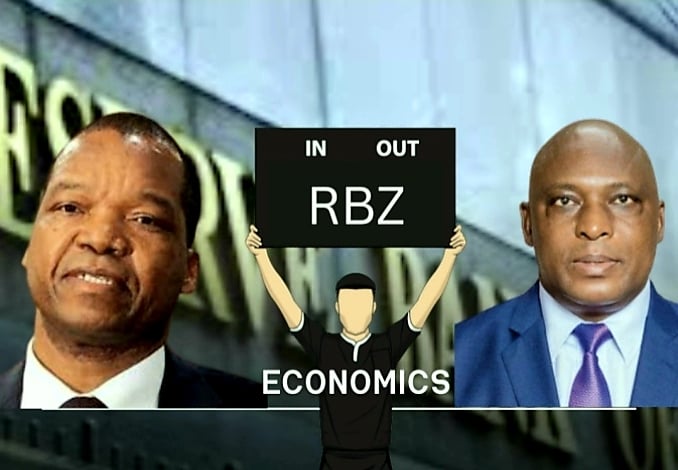The Zimbabwe markets and economy in general is on tenterhooks, pending the release of what will be Dr. John Mangudya's Reserve Bank of Zimbabwe's denouement. The last Monetary Policy announcement of his tenure. In the main because of the "Structured currency" teaser issued by the president, H.E., Dr. E.D. Mnangagwa.
Beyond the office farewell camaraderie as a backdrop to this important announcement, financial market practitioners are awaiting to hear more than just the exciting news of latest currency changes, and more from the departing Dr. Mangudya's coming to the end of his tenure. Tantalising as the temptation already to assess his term's delivery, it surely is not the be-all-and-end-all of news about the Central Bank, especially with the policy announcement pending.
Here I profile a few other topical concerns we hope the announcement will touch on when it is eventually made:
○ EXCHANGE RATE POLICY
This definitely will be addressed, no doubt, along with the pre announced Structured Currency, as well as the role of the Forex Auction system, not only in light of the successes of the Willing-Buyer-Willing-Seller (InterBank) regime. Equally expected will be the new role of the Monetary Policy Committee (MPC) if a Currecy Board is promulgated, and indeed the very role of the Central Bank itself in that circumstance!
Will the MPC morph into a Currency Board even, to manage the exchange rate pegging, since the structured currency will be indexed to gold and other assets? Will it be dispensed with completely? What will be the Central Bank's functions then, where interest rate manipulations and other Open Market Operations' (OMO) effectiveness are curtailed in the advent of the presence of a Currency Board? We wait with bated breaths.
○ LOW DOMESTIC SAVINGS & INVESTMENTS
Zimbabwe has a low domestic savings and investment rate, which hampers the economic growth and development potential. According to the RBZ, the gross domestic savings rate was 9,8% of GDP in 2022, while the gross domestic investment rate was 11,6% of GDP in 2022. These numbers likely didn't change much in 2023.
Technically, low savings and investment rate reflects low income levels, bely the high inflation, espouses limited financial intermediation, and evidence weak investor confidence. But a Zimbabwean phenomenon which is masked in these technicalities is "externalisation", (illicit outflows).
A) https://www.herald.co.zw/corporate-corruption-illicit-outflows-bleeding-zim/
B) https://www.techzim.co.zw/2017/12/bond-notes-blame-3b-externalised-2015-2017/
Just these two reports quoted above make for depressing reads for anyone who wishes the country well, showing astounding value loss by Zimbabwe's economy. This "leak" is equivalent to the country's National Budget, siphoned out of the economy every 2 years!
How will the policy arrest this and encourage money to stay in the economy? The benefits of doing so are so invaluable that ignoring this in the Monetary Policy is a no brainer!
○ MONITOR MONEY SUPPLY POINTS
The impact of non-banking institutions, for example Ecocash, Inbucks, and Delta Corporation, on Zimbabwe's monetary policy is significant and complex. Companies such as these do impact money supply, demand, and velocity, as well as the interest rates, exchange rates, and asset prices, in an economy no doubt.
We anticipate this monetary policy (or the next) to bring these organisations under direct Central Bank supervision (now that the Central Bank's role may be scaled back with the advent of a Currency Board being implemented). RBZ will need to require a review and revision of the legal and regulatory framework that will enable this supervision, a transfer and consolidation of the regulatory and supervisory authority to its offices, and a collaboration and coordination with other relevant stakeholders, like the Zimbabwe Revenue Authority (ZIMRA), for all this to work.
Siting these and similar companies by name is not singling them out for vilification at all, but instead, acknowledging their success, and equally their potential to distort the market as, naturally, they will act in self interest (for profit), which may, and often is, detrimental to smooth function of the economy.
And this is not me encouraging "government market intervention." More like asking for regulation as I see a need, and as government must; "regulate."
Let me explain;
My examples of Ecocash and Inbucks are mobile money platforms that allow users to send and receive money, make payments, and access other financial services using their mobile phones. Combined they control 99% of that business! Delta Corporation, on the other hand, is one of the largest companies in Zimbabwe, with a diversified portfolio of beverages, agro-industrial, and logistics businesses.
Ecocash and Inbucks operate under the supervision of the Postal and Telecommunications Regulatory Authority of Zimbabwe (POTRAZ), which is different from the Reserve Bank of Zimbabwe (RBZ), the central bank and the monetary authority of the country.
All this means that these entities and their peers are not subject to the same regulatory and prudential standards as banks, such as minimum capital requirements, liquidity ratios, reserve requirements, and stress testing. This creates a potential risk for the stability and integrity of the financial system, as well as the effectiveness and credibility of the monetary policy as such companies can distort the money fundamentals in Zimbabwe in several ways, such as:
- Expanding the money supply beyond the RBZ’s control:
By simply issuing electronic balances to their customers (which are not backed by physical cash or deposits in banks) these companies instantly "create money," or what we colloquially call "printing" if done by the Central Bank. Only in that case the money expansion would have been carefully calculated against fundamentals, which will not be the case if this is done by a company under POTRAZ or by another with a restaurant chain as its parent company.
Needless to say, this increases the money supply (M3) beyond the RBZ’s control, which, in turn, fuels inflation and exchange rate volatility.
And I'm not being an alarmist speaking theory here. Recorded precedents have been witnessed before. For example, in 2019, the RBZ even accused Ecocash of creating phantom money by allowing its agents to sell cash at a premium, which resulted in a mismatch between the electronic balances and the actual cash in circulation!
The RBZ even claimed at the time that Ecocash was responsible for 80% of the money supply growth in the country, which contributed significantly to the depreciation of the local currency. For a few days the company was ordered to shut down. This all screams that it's time the monetary authorities address this scenario. We wait to see if it is in this or the next policy announcement.
- Undermining the transmission and implementation of the monetary policy:
There's also the niggling matter that like-operating companies can undermine the transmission and implementation of the very Monetary Policy as the companies' operations offer alternative channels and instruments for financial transactions, which can reduce the demand for and the effectiveness of the RBZ’s policy tools (supposing after introduction of the structured currency RBZ will still retain previous OMO power), such as the policy rate, the reserve requirements, and the open market operations.
Case in point, in 2020, the RBZ increased the policy rate from 35% to 70% to curb inflation and stabilise the exchange rate, but this had little impact on the market. It turns out that this was because most transactions were done through Ecocash and Inbucks, which had lower and more stable charges.
Over and above that, just because of their money transaction market share, these companies can also influence the interest rates and the exchange rates in the market, which can create arbitrage opportunities and distort the price signals for the monetary policy.
As for big cash movers, like Delta Corporation, they affect the money demand and supply dynamics by their choices of payment methods and instruments, such as cash, bank deposits, mobile money, and electronic transfers, which can have implications for the velocity, circulation, and composition of money in the economy. Hence a threshold amount must be set beyond which corporates become automatically subject RBZ's Financial Intelligence Unit's (FIU) inspections.
○ CENTRAL BANK CORE BUSINESS
My expectations espoused above may be misconstrued as anticipations that the Central Bank will delve into quasi-fiscal activities and also interfere directly in private enterprise activity. Far from it. On the contrary, I actually anticipate that RBZ will complement the parent ministry, the Zimbabwe Treasury Department, who at various stages in 2023 announced stripping of the Bank's borrowing powers, took over its debts, cast stringent conditions for its printing activities, among many pronouncements to ensure it strictly follows its core business.
So my expectations, where they touch private enterprise, it's where the activities of these entities directly affect the central bank's "core business." That is money supply management, interest rates calculations, exchange rates optimasation, and the inflation targeting.
○ CONCLUSION
In the main, the impending Monetary Policy will enlighten us more on the incoming structured currency. It will surely touch on the roles of the MPC, or it's very existence as some analysts even anticipate a Currency Board (for the record, I am against it, but that is a discussion for another time). It will also by without doubt touch on the exchange rate regime that they have identified will work best with the structured currency, all depending on what its indexed too, the underlying value, whether it's a hard peg or floating equilibrium, as well as other related matters.
Finally, one way or another, the Monetary Policy will need to engage and show collaboration between monetary authorities and private entities, as well as other stakeholders, such as the government, the private sector, and the development partners, to foster a conducive and competitive environment for the financial sector and the monetary policy, as well as to promote the financial inclusion and innovation that are vital for the economic growth and development of Zimbabwe.
If not, then we await to see the tone and direction in the next Monetary Policy of the incoming Reserve Bank Governor , Dr John Mushayavanhu.
Well done to the old John. Good luck to the new John...


